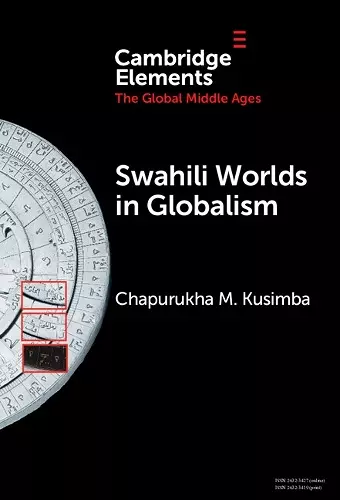Swahili Worlds in Globalism
Format:Hardback
Publisher:Cambridge University Press
Published:18th Jan '24
Currently unavailable, and unfortunately no date known when it will be back
This hardback is available in another edition too:
- Paperback£18.00(9781009074056)

This Element explains how African towns, cities, villages, and hinterlands were integrated into the global networks of the medieval period.
Discusses a medieval African urban society as a product of interactions among African communities who inhabited the region between 100 BCE and 500 CE. Positioned as the gateway into and out of eastern Africa, the Swahili coast became a site through which people, inventions, and innovations bi-directionally migrated, were adopted, and evolved.This Element discusses a medieval African urban society as a product of interactions among African communities who inhabited the region between 100 BCE and 500 CE. It deviates from standard approaches that credit urbanism and state in Africa to non-African agents. East Africa, then and now, was part of the broader world of the Indian Ocean. Globalism coincided with the political and economic transformations that occurred during the Tang-Sung-Yuan-Ming and Islamic Dynastic times, 600-1500 CE. Positioned as the gateway into and out of eastern Africa, the Swahili coast became a site through which people, inventions, and innovations bi-directionally migrated, were adopted, and evolved. Swahili peoples' agency and unique characteristics cannot be seen only through Islam's prism. Instead, their unique character is a consequence of social and economic interactions of actors along the coast, inland, and beyond the Indian Ocean.
'Kusimba's approach of presenting his ideas in accessible language has made his work highly readable to audiences even outside archaeology, history and anthropology. … Despite having read hundreds of publications and reports about the Swahili coast and vicinity, I benefitted greatly from reading this book. Combining multiple, interlinked sources to analyse and write about the Swahili worlds makes Kusimba's volume exceptional. Without any reservation, I recommend it to anyone interested in learning about ancient African globalism but with a focus on the western Indian Ocean region.' Elgidius B. Ichumbaki, Antiquity
'Kusimba's approach of presenting his ideas in accessible language has made his work highly readable to audiences even outside archaeology, history and anthropology. … Despite having read hundreds of publications and reports about the Swahili coast and vicinity, I benefitted greatly from reading this book. Combining multiple, interlinked sources to analyse and write about the Swahili worlds makes Kusimba's volume exceptional. Without any reservation, I recommend it to anyone interested in learning about ancient African globalism but with a focus on the western Indian Ocean region.' Elgidius B. Ichumbaki, Antiquity
ISBN: 9781009495080
Dimensions: 235mm x 159mm x 11mm
Weight: 270g
106 pages